|
|
|
Sort Order |
|
|
|
Items / Page
|
|
|
|
|
|
|
| Srl | Item |
| 1 |
ID:
171209
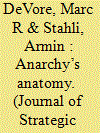

|
|
|
|
|
| Summary/Abstract |
No issue deserves more scrutiny than the mechanisms whereby popular unrest unleashes civil wars. We argue that one institution – two-tiered security systems – is particularly pernicious in terms of the accompanying civil war risk. These systems’ defining characteristic is the juxtaposition of small communally stacked units that protect regimes from internal adversaries with larger regular armed forces that deter external opponents. These systems aggravate civil war risks because stacked security units lack the size to repress widespread dissent, but inhibit rapid regime change through coup d’état. Regular militaries, meanwhile, fracture when ordered to employ force against populations from which they were recruited.
|
|
|
|
|
|
|
|
|
|
|
|
|
|
|
|
| 2 |
ID:
117620


|
|
|
|
|
| Publication |
2012.
|
| Summary/Abstract |
Since late 2010, an unprecedented wave of protests demanding greater political freedoms, and in several countries even regime change, has swept across much of the Arab world. In Tunisia, Egypt, and Libya, long-standing autocrats have been toppled, and in other countries of the region seemingly well-established authoritarian regimes also appeared increasingly shaky in the face of growing opposition movements. The aim of this article is to examine the role of the armed forces in these popular uprisings. While military forces have been key actors in these Arab uprisings, they have responded quite differently across the region to prodemocracy movements, ranging from openness to protest movements, to internal fracturing, to firm support for the regime in power. This article argues that these differences can be explained with reference to different forms of civil-military relations and different characteristics of the military apparatus. It claims in particular that the degree of institutionalization of the armed forces and their relationship to society at large can account for the divergent responses to pro-reform movements.
|
|
|
|
|
|
|
|
|
|
|
|
|
|
|
|
| 3 |
ID:
141172
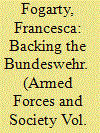

|
|
|
|
|
| Summary/Abstract |
Along with Germany’s suspension of the Wehrpflicht (mandatory service requirement) in 2011, the Bundeswehr has been reformed to accommodate an all-volunteer force. In the years that followed, studies were conducted to determine the state of civil–military relations in Germany via the opinions of military leadership regarding the reforms and via the opinions of civilians on their perspective of the military in general. This study provides additional data from the perspective of young soldiers (n = 347) at the Universität der Bundeswehr München and the Helmut Schmidt Universität in Hamburg regarding the civil–military relationship in Germany as of early 2014. The results indicate that the majority of these young soldiers are satisfied with their decision to join the Bundeswehr, yet they feel unsupported and underappreciated by the society they serve.
|
|
|
|
|
|
|
|
|
|
|
|
|
|
|
|
| 4 |
ID:
119058
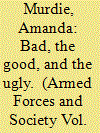

|
|
|
|
|
| Publication |
2013.
|
| Summary/Abstract |
Does civil-military conflict harm military effectiveness? Most previous empirical literature on the effects of civil-military conflict has utilized dichotomous indicators of the presence or absence of overall civilian control. However, the extant theoretical literature is clear that mid-levels of civil-military conflict could be good for innovation and overall decision making. In line with these arguments, the author argues that we should not expect all civil-military conflict to harm military effectiveness and, by extension, international crisis bargaining outcome. Instead, some civil-military conflict should have a positive effect on the overall success of the military. Utilizing new events data that captures the level of civil-military conflict cross nationally from 1990 to 2004, the author examines how civil-military conflict actually has an inverse U-shaped relationship with crisis success. This project also adds to the theoretical literature by examining variations across different degrees of civil-military conflicts, drawing attention to the usefulness of mid-range civil-military "friction."
|
|
|
|
|
|
|
|
|
|
|
|
|
|
|
|
| 5 |
ID:
140561
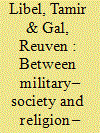

|
|
|
|
|
| Summary/Abstract |
The growing religiosity in the Israel Defense Forces (IDF) in recent years is discussed by employing the broader lens of changes to the organization's overall manpower. First, the authors will indicate the dynamic and changing make-up of those serving in the IDF, in terms of both the socio-demographic characteristics of conscripted soldiers, and the motivation of individuals enlisting in the IDF. Second, it is demonstrated how a window has opened in the IDF, especially in combat units and command roles, for a growth in religiosity as a result of the gradual increase in the number of conscripts affiliated with the Zionist national-religious population.
|
|
|
|
|
|
|
|
|
|
|
|
|
|
|
|
| 6 |
ID:
172106


|
|
|
|
|
| Summary/Abstract |
Emerging powers from the global south have generally opposed the use of force in international politics. However, taking a closer look at the area of peacekeeping, the international community’s most institutionalized response to international insecurity, it is clear that the global south has been actively engaged in what has been described as peacekeeping’s coercive turn: the increasingly greater use of force. Building on the cases of Brazil and Indonesia, we argue that the peacekeeping policies of these emerging powers have been inconsistent with their declared reticence to use force. We explain the inconsistency by reference to knowledge imbalances between civilian and military actors, a gap in peacekeeping expertise and involvement in policy-making that allowed the armed forces to push the two countries into increasingly coercive peacekeeping. Moreover, civil–military knowledge imbalances prevented the emergence of alternative ideas more in line with Brazil’s and Indonesia’s traditional stance on the use of force.
|
|
|
|
|
|
|
|
|
|
|
|
|
|
|
|
| 7 |
ID:
117624
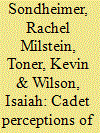

|
|
|
|
|
| Publication |
2013.
|
| Summary/Abstract |
Evidence of an actual or perceived gap in ideological beliefs between civilian and military communities informs current debates on the military and its relationship to broader society. The authors examine one cohort of the military and its members' perception of their own ideology in relation to their civilian counterparts using a 2009 survey of cadets at the United States Military Academy. The authors ascertain cadet perceptions of (1) cadet ideological leanings on individual and aggregate levels, (2) the ideological leanings of the civilian population, and (3) the civilian population's assessment of the military's ideological leanings. The authors attempt to discern whether or not this military subpopulation perceives itself as different from the rest of society. The authors find that while members of the Army's future officer corps perceive themselves as more conservative than their civilian peers and society writ large, as a group they hold rather moderate political views.
|
|
|
|
|
|
|
|
|
|
|
|
|
|
|
|
| 8 |
ID:
139114
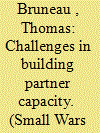

|
|
|
|
|
| Summary/Abstract |
The main emphasis in US security assistance is ‘building partner capacity’. To understand prospects for building capacity implies knowledge of the security sector, including the armed forces and also national police and intelligence agencies. The scholarly sub-discipline that should be useful for analysis of a nation's use of armed forces is civil–military relations as it ostensibly directs attention to when and how civilians choose to utilize their nation's armed forces. The goal in this article is to further refine the field of civil–military relations by focusing attention on two main concepts – democratic civilian control and strategy – and discussing their relevance in the context of building partner capacity.
|
|
|
|
|
|
|
|
|
|
|
|
|
|
|
|
| 9 |
ID:
120306
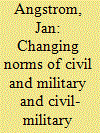

|
|
|
|
|
| Publication |
2013.
|
| Summary/Abstract |
The dichotomy between civil and military is well-established in international political practice. International law, international order, and war are but some of the institutions that rely upon making a distinction between civil and military. The distinction, arguably, is also central for analyses of conflicts worldwide. Almost daily, we are fed stories of atrocities against civilians in conflict-ridden parts of the world. In academic discourse, similarly, several fields of study including most of the debate centering on interpreting modern war relies upon a distinction between civil and military. Both research and practice, however, tend to treat these categories as fixed and global. In this article, I argue - to the contrary - that what constitutes civil and military are malleable norms. This forms a particular challenge to analyses of civil-military relations and it calls for a different categorization of civil-military relations in Weberian ideal types.
|
|
|
|
|
|
|
|
|
|
|
|
|
|
|
|
| 10 |
ID:
109946
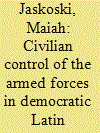

|
|
|
|
|
| Publication |
2012.
|
| Summary/Abstract |
This article presents a new framework for measuring civilian control of the armed forces in post-transition Latin America. Specifically, it builds on approaches that focus on military privileges and military protest, particularly in the face of government challenges to those privileges. Adding mission performance as a third dimension both helps us measure civilian control more accurately and provides causal leverage, as the three dimensions can interact. The paper demonstrates the utility of the framework through a close-up analysis of a critical case: civil-military relations in Peru since the 1990s.
|
|
|
|
|
|
|
|
|
|
|
|
|
|
|
|
| 11 |
ID:
117625
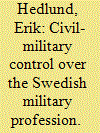

|
|
|
|
|
| Publication |
2012.
|
| Summary/Abstract |
Civil-military relations and the autonomy of the military profession in Sweden have varied over time depending on the perceived level of external threats. In this article, we set out to conduct an analysis of Swedish civil-military relations over a period of more than twenty-five years from 1984 to 2011. Our analysis is made from the perspective of civil-military control of (1) the military officer rank system and (2) the professional officer education system, for all three services. The analysis is based on Samuel Huntington's and Morris Janowitz's theoretical discussion of "objective" and "subjective" civilian control over the military and will give answers on how the Swedish armed forces have been effected by objective and subjective civilian control during the late Cold War era and after the fall of the Berlin Wall in 1989. The findings of this study confirm the assumption that civil-military relations vary over time because of perceived external threats but also because of new threats, new tasks, and increased globalization and cooperation in multinational international operations.
|
|
|
|
|
|
|
|
|
|
|
|
|
|
|
|
| 12 |
ID:
120307
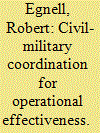

|
|
|
|
|
| Publication |
2013.
|
| Summary/Abstract |
The last decade has witnessed a cascading proliferation of strategic concepts that emphasise the importance of civil-military cooperation, coordination, or integration for effectiveness in complex operations. These efforts nevertheless often lack an appreciation for why, where, and how such integration and coordination should take place to achieve the desired outcomes. This article introduces a new approach to civil-military coordination that incorporates the challenges and possibilities at both the national/strategic level and the tactical level in field of operations. By integrating and coordinating these efforts at the strategic level, this approach allows policymakers to achieve separation of actors and responsibilities in the field of operations. By doing so, the proposed approach seeks to answer more specific questions about when coordination is necessary for effectiveness, what its aims are, what actors need to be involved, and to what extent and at what level of command the actors need to be coordinated.
|
|
|
|
|
|
|
|
|
|
|
|
|
|
|
|
| 13 |
ID:
127811
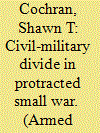

|
|
|
|
|
| Publication |
2014.
|
| Summary/Abstract |
This article examines the basis of military leadership preferences toward war termination, and thus the basis of the associated civil-military divide, within the context of protracted small war. The conventional wisdom posits military leadership preferences as a near-constant in favor of persistence and thus expects a dominant pattern of military obstructionism. However, such a pattern does not hold empirically across the population of small wars. This gap between expectation and evidence derives at least in part from the limits of the bureaucratic-organizational model, focused on the military's desire for resources, autonomy, and influence, that underlies the conventional wisdom. In contrast, this article suggests an alternative model privileging the demands of institutional legitimacy. The legitimacy motive as conceptualized here is particularly salient to the small war context. It accordingly provides a foundation for better understanding variation in military leadership preferences toward war termination and thus variation in the direction and intensity of the civil-military divide.
|
|
|
|
|
|
|
|
|
|
|
|
|
|
|
|
| 14 |
ID:
124063
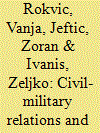

|
|
|
|
|
| Publication |
2013.
|
| Summary/Abstract |
This article focuses on the democratization of civil-military relations and the implementation of democratic control of the armed forces in the Republic of Serbia. By analyzing the basic parameters of democratic civil-military relations, we attempt to evaluate whether civil-military relations in the Republic of Serbia can be classified into a type of relations that occur in consolidated democracies. Based on an examination of legal documents and other data, this article concludes that democratic changes since October 2000 have greatly influenced the course of relations between military and political elites and that civil-military relation in Serbia meet most of the defined parameters. However, due to the difficulties in the implementation of this control in practice, civil-military relations in Serbia can only partially be classified as a type of relations that occur in consolidated democracies.
|
|
|
|
|
|
|
|
|
|
|
|
|
|
|
|
| 15 |
ID:
171210
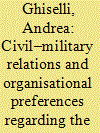

|
|
|
|
|
| Summary/Abstract |
This article analyses the positions of the Chinese civilian leaders and military elites on Military Operations Other Than War in order to shed light on their preferences about the use of the armed forces in foreign policy between the late 1990s and the early 2010s. Over time, a significant divergence developed between civilians and soldiers until 2011, when the Libyan crisis happened. The study also prompts important considerations about our understanding of civil–military relations in China and future role of the People’s Liberation Army as a tool of statecraft in foreign policy.
|
|
|
|
|
|
|
|
|
|
|
|
|
|
|
|
| 16 |
ID:
113178
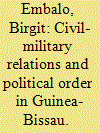

|
|
|
|
|
| Publication |
2012.
|
| Summary/Abstract |
Since independence in 1974 the military of Guinea-Bissau have succeeded in controlling the political system, even attempting to impose their rule directly in the aftermath of the 1998/9 war. What makes the analysis of civil-military relations and political order in contemporary Guinea-Bissau particularly challenging is the overlapping of political, ethnic and personal considerations of the politico-military elite and their fluctuating and ambiguous short-term alliances. Guinea-Bissau's armed forces include an amalgam of veterans, claiming historical legitimacy from the liberation war, and officers who use their positions for personal gain rather than furthering democracy and national interests. This article examines the logic of civil-military relations against the heterarchical political figuration and the specific character of the politico-military elite of Guinea-Bissau.
|
|
|
|
|
|
|
|
|
|
|
|
|
|
|
|
| 17 |
ID:
127814
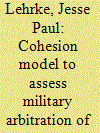

|
|
|
|
|
| Publication |
2014.
|
| Summary/Abstract |
The purpose of this article is to outline a model of cohesion useful for assessing military arbitration of revolutions. Current approaches to the study of revolution are not able to adequately integrate the military into their analysis. To remedy the lack of appropriate tools, this article outlines a model of cohesion that may be useful for conceptualizing and examining the behavior of military forces during domestic political crises. Building on the so-called standard model of cohesion, the article develops a cohesion-coordinated action model that incorporates a structural social cohesion element and a voluntarist-coordinated action element, both of which also capture the relations and interactions between the military, the regime, and the opposition. It thereby fulfils the requirements that a model must possess but where other approaches fall short. The article concludes by outlining how this model can be used in further research in order to advance the study of the military's role in revolutions.
|
|
|
|
|
|
|
|
|
|
|
|
|
|
|
|
| 18 |
ID:
112376


|
|
|
|
|
| Publication |
2012.
|
| Summary/Abstract |
This study introduces the new concept of targeted partnership, which encourages robust dialogue between military officers and policy makers to create and implement effective military strategy such as counterinsurgency. Targeted partnership is a distillate form of concordance theory or agreement involving reciprocity between the military, political elites, and society for a limited period of time to accomplish a very specific objective. Targeted partnership may involve the temporary co-mingling of military, political, and societal boundaries even when the broader institutional and cultural relationship between military and society may be one of separation. In other words, separation and integration may exist at the same time for very specific reasons central to a nation's foreign policy. Targeted partnership is a practical extension of concordance theory that enables the military to have effective interactive dialogue with policy makers to explore critical military strategies, such as counterinsurgency, while considering the cultural and institutional contexts of foreign nations.
|
|
|
|
|
|
|
|
|
|
|
|
|
|
|
|
| 19 |
ID:
124171
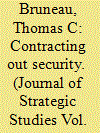

|
|
|
|
|
| Publication |
2013.
|
| Summary/Abstract |
Private security companies (PSCs) currently receive a great deal of attention in the news media, in sensationalist reporting, and increasingly in scholarly books and articles. While the scholarly books and articles make significant contributions to our understanding of this global phenomenon, there are several impediments to analysis that must be recognized and overcome if analysis is to be improved. Three of these impediments are reviewed in this article. The author suggests that US government material is currently available to minimize impediments and offers a framework to make analytical sense of it. Since contracting out is based on contracts, and unless the complexities of awarding and managing contracts are understood, recommendations made to reform the process of contracting out security are unrealistic.
|
|
|
|
|
|
|
|
|
|
|
|
|
|
|
|
| 20 |
ID:
173753
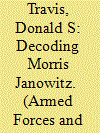

|
|
|
|
|
| Summary/Abstract |
The American sociologist Morris Janowitz presented two world views of security named “absolutist” and “pragmatist.” This dualistic paradigm endures into the 21st century and explains how complex and contentious security options are debated within the U.S. security establishment. His paradigm also reveals a condition called the “hegemon trap,” which means that the more powerful militarily that a state becomes relative to other states, the less likely it will fight a large-scale conventional war, resulting in frequent and perpetual limited, low-intensity, and unconventional wars. Based on experiences learned since the Vietnam War, the United States can improve global security by balancing resources between absolutist and pragmatist outlooks. This requires devoting a greater share of resources toward peacetime engagement, stability operations, and unconventional warfare.
|
|
|
|
|
|
|
|
|
|
|
|
|
|
|
|
|
|
|
|
|